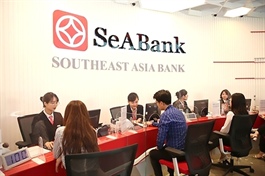'Buy now, pay later' poses risk if left uncontrolled
'Buy now, pay later' poses risk if left uncontrolled
Although "Buy now, Pay later" (BNPL) - a type of financing that allows consumers to make purchases and pay for them over time - is growing in popularity in Việt Nam, experts worry it could pose some financial risks if left uncontrolled.

A merchant in Ninh Thuận Province puts her products for sale online. BNPL financing has been a big push for e-commerce sales in Việt Nam. — VNA/VNS Photo Nguyễn Thành |
Phạm Nguyễn Anh Huy, senior lecturer in finance at RMIT University, said BNPL companies have ample room for growth thanks to the low credit card usage and high consumer demand in the country.
"Consumption demand is rising steadily against a backdrop of merely 5.0 to 6.0 per cent of the population using credit cards. That's where BNPL comes in handy," said the lecturer.
Huy said with BNPL, consumers can pay for items, normally of less than VNĐ10 million (US$423), in a series of interest-free instalments. However, that's only part of the story.
Given that BNPL-financed loans are fairly easy for consumers to get approved, some consumers tend to overspend on items they wouldn't normally be able to afford if they had to pay upfront, leading to excessive debt that is difficult to manage.
The risk of default would be even higher for consumers of financial illiteracy and when lenders fail to access the creditworthiness of their borrowers. Risk management, he said, would be instrumental in keeping the risk in check.
According to the Vietnam Banks Association, the rate of consumers in default has been climbing steadily in recent years owing to the practice of "deliberate default".
Consumers dodge paying back their loans because they know they can do so with impunity. Legal loopholes make it almost impossible to bring to court those who default on low-value loans.
Another problem is that BNPL platforms have no connection with the Credit Information Centre (CIC). Without CIC data, they have to assess the creditworthiness of borrowers based on past transactions.
This is an approach that could result in default risk underestimation.
BNPL also carries data security risks because BNPL-financed purchases are made through a third-party's platform. Although data-sharing has been legally regulated, specific rules for the BNPL industry have yet to be put in place.
Senior Lecturer Huy said BNPL non-performing loans could soar if the industry is left to its own devices without governmental control. Rising non-performing loans, in turn, would erode lenders' profits and push them into bankruptcy, as was the case of Openpay in Australia recently.
He also said amid the current economy marked by high inflation and high interest rates, investors tend to switch their portfolios away from risky investments and technology companies tend to lay off staff.
"As a result, BNPL companies are likely to suffer a wave of liquidity shortages, which could negatively affect the growth of the industry," said Huy.
It is also worth noting that Atome, a BNPL company run by Singapore-based Advance Intelligence Group, has confirmed its withdrawal from the Việt Nam after entering the country just last year.
In a statement to Tech in Asia, the company said Việt Nam's contribution to its overall business was limited and it began a planned and orderly pause of its operations in the country in May.
Research & Market data show that the BNPL financing industry in Việt Nam would reach a compound annual growth rate of 31.1 per cent between 2023 and 2028. BNPL-financed purchases are expected to climb from $1.4 billion in 2022 to $8.8 billion in 2028.
























